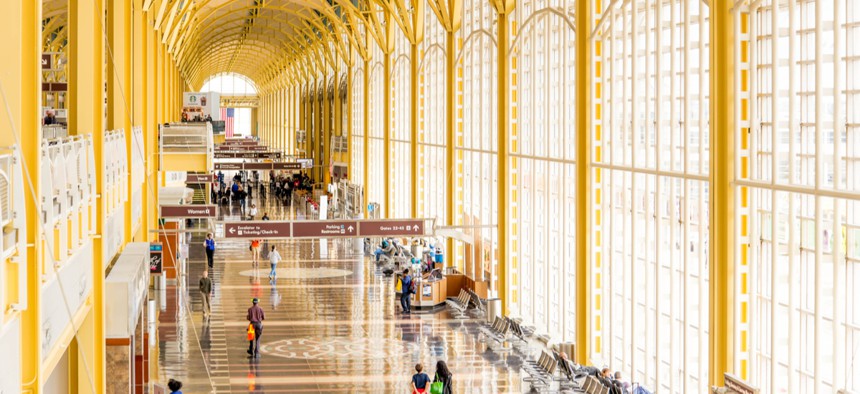D.C. Airport Pilots TSA’s New ‘Self-Service’ Biometric Tech To Confirm IDs in Real-Time

CaseyMartin/Shutterstock
The work builds on a prior test of the credential authentication technology.
A new Transportation Security Administration-led pilot at D.C.’s Ronald Reagan Washington National Airport explores touchfree, “self-service” biometric verification technology that aims to confirm travelers’ identities at checkpoints in near real time.
Building on a prior assessment of the credential-approving tech at an airport further west, the pilot encompasses a process through which a camera-equipped unit digitally matches each participating passenger’s live photo with the photo on their identity documents. It then confirms and speedily displays the result and the person’s flight information to a TSA officer—who is now positioned behind a shield to lessen human contact amid the pandemic.
“In light of COVID-19, advanced health and safety precautions have become a top priority and part of the new normal for TSA,” David Pekoske, TSA’s administrator, said in a statement Tuesday. “As a result, we are exploring rapid testing and deployment of this touchless, self-service technology.”
The new standard at the airport amid the pilot is that travelers walk up to the device and present their IDs into a scanner—as opposed to handing it to the federal officer—“thus promoting social distancing and reducing physical contact” during the pandemic, TSA pointed out. The tech will also snap a live photo of the traveler, compare it to the ID picture, and show face matching results, as well as identity and flight information confirmations to a TSA officer.
Travelers who do not wish to participate in the pilot can decline to have their photos taken, but must say so to TSA staff. The agency also confirmed that photos captured of passengers through the initiative aren’t saved and “there is no capacity to do so.”
The tech tools validate “several thousand types of IDs,” according to TSA, including: U.S. passports, permanent resident cards and visas; U.S. driver’s licenses and other types of photo ID that state motor vehicle departments issue; U.S. military common access cards and other military ID cards; and more.
TSA Spokesperson Lisa Farbstein told Nextgov Wednesday that the agency is working directly with Idemia, a vendor that’s providing the equipment and technology underpinning the pilot.
The “best case scenario is that the pilot is expanded to additional airports” down the line, Farbstein said.
The present program in D.C.’s airport comes after TSA completed an earlier 30-day test of the authentication technology last September at McCarran International Airport in Las Vegas. The agency refined the technology alongside experts from industry, following that initial assessment.
Pekoske said once the current D.C.-based pilot concludes, TSA expects “to be able to determine how positioning the new technology will allow passengers to use it themselves thereby providing a safer checkpoint experience, while adding significant security benefits.”






